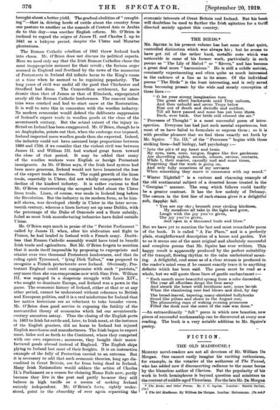THE BIRDS. * Ma. Sou= in his prevent volume has lost
none of that quiet, controlled distinction which was always his ; but he seems to have got rid of the rather hard, metallic note which was noticeable in some of his former work, particularly in such poems as " The Lily of Malud " or " Rivers," and has become a great deal more " harmonious." He is still a, subtle metrist, constantly experimenting and often quite as much interested in the cadence of a line as in its sense. Of the individual poems " The Birds " is the least interesting, and is only saved
from becoming prosaic by the wide and steady conception of these lines :- " 0 let your strong imagination turn
The great wheel backwards until Troy unburn, And then unbuild and seven Troys below Rise out of death and dwindle and outflow, Till all have passed and none has yet been there. Back, ever back. Our birds still crossed the air."
" Processes of Thought " is a most successful poem of intro. spection. Everyone has had just such mental experiences, but most of us have failed to formulate or express them ; so it is with peculiar pleasure that we find them exactly set forth by Mr. Squire. " No. IIL" of the " Processes " begins with these striking lines—half biology, half psychology :-
".Into the pits of my heart and brain My eyes, ears, nose, tongue, fingers like five gardeners Are shovelling sights, sounds, odours, savour, contacts, While I, their master, casually nod and most times, Forgetting that the work is going on, And only fully conscious of my servants
When something they move is consonant with my mood."
" Winter Nightfall " is a curious and charming example of the old sentimental subject of a deserted house treated in the "Georgian " manner. The song which follows could hardly be a greater contrast. It has the low melody of Debussy. The caesura in the first line of each stanza gives it a delightful soft, Sapphic fall.
" You are my sky; beneath your circling kindness, My meadows all take in the light and grow, Laugh with the joy you've given,
The joy you've given,
And open in a thousand buds and blow."
But we have yet to mention the last and most remarkable poem of the book. It is called " A Far Place," and is a perfectly plain, straightforward description of a house and garden. Yet to us it seems one of the most original and absolutely successful and complete poems that Mr. Squire has ever written. This happy result is apparently produced by the perfect suitability of the tranquil, flowing rhythm to the calm unrhetorical mean- ing. A delightful, cool sense as of a clear stream is produced in the reader's mind even if he cannot exactly trace it to anything definite which has been said. The poem must be read as a whole, but we will quote these lines of gentle enchantment :- "Each month more beautiful sprang from a robe discarded, The year all effortless dropt the best away
And struck the heart with loveliness new, more lavish When the clambering rose had blown and died, by day The broad-leaved, tapering, many-shielded hollyhocks Stood like pillars and shone to the August sun, The glimmering cups of waking evening primroses Filled the dusk now the scent of the rose was done."
—An extraordinarily " full " poem in which new beauties, new pieces of successful workmanship can be discovered at every new reading. The book is a very notable addition to Mr. Squire's
poet!






































 Previous page
Previous page